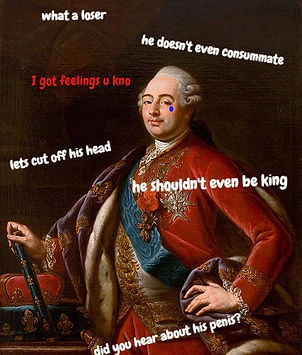AP
Est. 1300
Get Wrecked for European History

The impact of the revolution on women is not a big one, and not even remotely important. During the revolution women were still seen as far different from men, and to be kept in the home. Women's rights were not discussed in the National Assembly because they were not seen as a "persecuted group" like blacks or Jews. Basically, women in the Revolution barely got any say as they weren't invited into politics. During the Reign of Terror, women would be arrested and executed for complaining about food shortages. But post-Revolution women weren't that better off. Every time they asked for equal rights they were denied, and never gained political freedom or the ability to be in office. But this had caused women to notice their social status and start fighting to raise it. Other than that, they really gained nothing.
Source(s): https://chnm.gmu.edu/revolution/chap5a.html, one presentation you did that mentioned women
After Louis XIV was executed, Robespierre did a lot of stuff he probably shouldnt have. The whole Reign of Terror and de-Christianization of France all kinda, made people start to hate him and the group he lead. Let's start with ye olde Reign of Terror, what was it? Basically, Robespierre and his radical buddies decided that everyone was getting a little too 'counter-revolutionary' for their liking. So anyone they thought wasn't doing enough revolutionary stuff, or really anyone they didn't like, they would arrest them and put them in jail without trail. People obviously didn't like that I mean, wasn't the Revolution supposed to give you more freedom? But this one was taking away your freedoms once you did something they thought wasn't 'enlightened enough'.
There was also some dechristianization going on. Now France today is a pretty fricken' christian state, it's hard to believe a huge thing like this happened! Well it did, and trust me, no one liked it so it ended around mid-1794. But it still happened, France even made a new calendar based on 'reason'. They turned all churches into 'temples of reason', that sounds a bit to cult-like for me but whatever France. Still, lots of unhappy people over this, they wanted the freedom to worship man!
Price fixing didn't really do any good, it was kinda seen as eh. You couldn't really stabalize prices and wages with an economy this bad dude. But yes, all these things combined into one big angry France, and the people turning against Robespierre and his mates. Everyone just agreed they weren't really helping anymore and decided to kill him and his closest followers. Everyone was happy, and then, Napoleon came.
Source(s): A History of Western Society, some more notes
The liberal phase of the French Revolution made a heck-ton of changes, but we're gonna focus on the big three. First, what the McFrick™ was the Declaration of the Rights of Man and of the Citizen? Well it was this cool declaration that said every MAN was guarunteed equality before law, individual rights for all MEN, and representative government for the soveerign people. It was only two pages long but was seen as a revolutionary document. It didn't really help the poor and hungry, and didn't affect women at all, but otherwise it was seen as hella cool!
What's the Civil Constitution of the Clergy? Well it was written in July of 1790, and affected the clergy obviously. Pretty much, the Catholic clergy had to swear an oath to the government instead of the church and the preists had to be elected by voters. Most preists never swore the oath and a heck-ton of Catholics were upset with this cause you know, according to Catholic teachings, your religion comes before EVERYTHING.
Lastly, the Constitution of 1791. This was written in September of 1791(of course). Mostly it just changed France into a constitutional monarchy, which was like a huge deal cause that's one big point from the revolution. Score for the third estate amirite. It also tried taking care of France's disaster of a tax system by establishing a "franchise". What it did was, every MAN who voted had to pay taxes. These things were pretty ok, they might have worked better over time too. We'll never know though, since it barely lasted a year.
Source(s): A History of Western Society by McKay, more notes!!
Look at everything that women gained!!
There were many causes for the start of the French Revolution. Long standing social issues were a big reason. Social problems were such as, the third estate was heavily funded to keep France running, and they had little to no say in the government. So the Third Estate revolted to get freedom from serfdom and high taxes. Political causes include the effects of the bourbon monarchs and the people's view on them. You see, Louis XIV, XV, and XVI were all very huge spenders and helped to generate a huge debt for France. They also ruled by divine right (which was being scrutinized because of Enlightenment ideas) and created the lettres de cachet, which allowed someone to be arrested and sentenced without a trial. Lastly, Louis XVI was seen as weak and 'unfit to rule', mainly caused by his erectile dysfunction. And his choice of wife wasn't the best either, as he had married Marie Antoinette. Marie was an Austrian who was seen by the French people ass a self-centered teenage brat. During this time, there was also huge economic issue. A large increase in food prices caused by a poor harvest and sudden population boom caused many to go hungry. And there was still the huge national debt caused by the American Revolution, building of Versailles Palace, Seven Years War, every war started by Louis XIV, and every bourbon king's reckless spending! With France's inefficient taxation system, this wasn;t going away at all! Then plus the enlightenment ideals causing us to question 'divine right' ruling, who wouldn't attempt to overthrow their king and create a better government for everyone's benifit?
Source(s): A History of Western Society by McKay, French Revolution presentation

Napoleon made many domestic changes to France in an attempt to make it better, but really he probably didn't know what he was doing. But hey, it was good while it lasted.
First things first, Napoleon just gets rid of the Directory, but most wanted it overthrown anyway. They didn't rule very dictator-y. So Napoleon just took over, and used his military knowledge and popularity to maintain order in France. He even established his own law, the Napoleonic Code! It made sure every MALE was equal and had security of wealth and priate property. What about women you say? Well we could refer to it in French as comme ci comme ça. You see, it kinda took away almost all that women had gained in the revolution, which wasn't even much to begin with! It's probably because Napoleon was one of those guys who thought a woman should be dependant of her father or husband, and should stay in the house to raise kids. But hey, he established a bank for France to help control the economy and let peasants keep the status' gained in the Revolution, so that's cool.
Outside of France he was.. less great. He kinda just went where ever and tried making it a French sattelite state. He mostly targeted Austrian lands, and took almost all germanic land in Europe except for Prussia, Saxony, and Austria itself. France also claimed Netherlands, Belgium, Spain, and parts of Northern Italy. How? He just kept invading neighboring countries to expand his wealth! Also kind of to spite Britain, as all French owned ports refused to allow British ships to dock, and France owned A LOT or land. He even tried to have all countries in Europe agree to his Continental system, and as you will see, this is kinda where everyone agreed to get rid of him.
Now, the few remaining free countries, Austria, Prussia, Russia, and Britain, all pledged to team up so they could all get rid of Napoleon. The Grand Empire was the largest it would ever be at that time, but everyone decided to just kill it now. Countries under French rule started revolts to fight back, Napoleon's Continental System was hurting France instead of Britain! So Napoleon decided. in June of 1812, to invade Russia. This was widely reguarded as a bad move. Long story short, he tries invading Moscow in the middle of winter instead of waiting it out, his army of 600,000 men is reduced to 30,000 because Moscow was burned to the ground so the French wouldn't have food or shelter. Then Napoleon just kinda abandons his army after the retreat, and he is later properly defeated in the Treaty of Chaumont. He even gets his own little island.
Source(s): A History of Western Society by McKay
I thought you might like this..